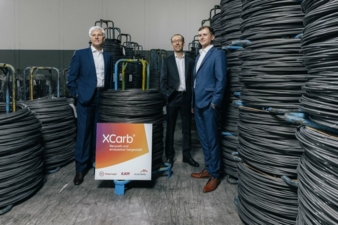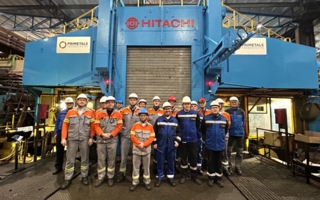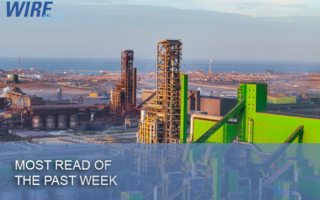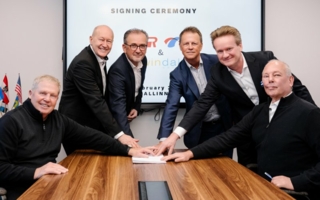13/06/2023 – Cooperation Arcelor Mittal, Finkernagel and Ejot
How a sustainability chain works
It is obvious that ambitious climate targets can only be achieved by working together. The cooperation between Arcelor Mittal, Finkernagel and Ejot is a good example and a premiere for a cooperation between manufacturer, processor and end-product producer to reduce environmental impact.
Arcelor Mittal Hamburg produces “XCarb” recycled and renewably produced steel – which has a CO2 footprint significantly lower than conventionally produced steel - which the wire-drawing company Finkernagel processes further; Ejot, in turn, produces screws from the drawn wire in cold forming, which are ultimately used for batteries in electric cars and for solar panel structures. By using “XCarb” recycled and renewably produced, the CO2 savings total 80 % compared with conventionally produced steel, and the low-carbon emissions steel ultimately benefits the energy transition thanks to its use in solar modules and electric cars. At Finkernagel's headquarters in Altena, North Rhine-Westphalia, the three companies have now made the cooperation public.
Uwe Braun, CEO of Arcelor Mittal Hamburg: "Thanks to this cooperation, we are creating a special value chain that contributes to the climate goals of the companies involved. Once again we see that low carbon-emissions steel is vital for building the infrastructure we need for the transition to carbon neutrality. After all, solar modules, efficient electric cars or wind turbines cannot be made without steel. We are already able to produce very low-carbon and, in a few years, climate-neutral steel. For us, it's about doing our homework and continuously working on such promising projects in cooperation with our customers.”
Timo Finkernagel, Managing Director of Finkernagel: "Through our trials, we know that the “XCarb” recycled and renewably produced steel can be processed excellently and has no quality disadvantages compared to conventional steel. The fact that the material properties are also identical in a direct comparison is particularly pleasing. We are proud to be able to offer “XCarb” recycled and renewably produced to our customers and are confident that it will be well received in the market."
Markus Rathmann, Chief Supply Chain Officer of the Ejot Group: "The entry into the processing of CO2-reduced steel marks an important step for the Ejot Group on the way to climate neutrality, especially since the largest part of the CO2 emissions is in our preliminary products (Scope 3). We will successively expand the use of CO2-reduced steel."
Since 2021, the world's leading steel producer Arcelor Mittal has been bundling all efforts towards climate-neutral steel production with the umbrella brand “XCarb”; by investing in technologies and start-ups, by awarding certificates for CO2 savings in steel production and especially by low-carbon manufacturing variants. The XCarb steel made from recycled and renewable material is produced in an electric arc furnace using 100% renewable electricity and up to 100% scrap depending on the steel grade. For these steel products, emissions can be as low as 333 kilograms of CO2 equivalents per tonne of end product.
The XCarb recycled and renewably produced used by Finkernagel and Ejot respectively significantly reduces the Scope 3 emissions of both companies. The Ejot Group aims to reduce its CO2 emissions from the current level of approx. 190,000 tonnes per year to zero by 2035. In addition to a variety of its own measures to reduce Scope 1 and Scope 2 emissions, Finkernagel is primarily focusing on the use of a low-CO2 steel input material. According to its decarbonisation strategy, Arcelor Mittal aims to achieve net zero emissions worldwide by 2050.
The partners
Arcelor Mittal is the world's leading steel and mining company with a presence in 60 countries and primary steelmaking facilities in 16 countries. In 2022, Arcelor Mittal had revenues of $79.8 billion and crude steel production of 59 million tonnes, while iron ore production reached 45.3 million tonnes. Decarbonisation is the most important aspect of Arcelor Mittal's long-term strategy. We are aligning with the goals of the Paris Agreement and the European Green Deal by committing to reduce European CO2 emissions by 35% by 2030 and to reach net zero by 2050. Arcelor Mittal is listed on the New York (MT), Amsterdam (MT), Paris (MT), Luxembourg (MT) and Spanish stock exchanges of Barcelona, Bilbao, Madrid and Valencia (MTS). http://corporate.arcelormittal.com/
The Fritz Finkernagel Drahtwerk GmbH+Co. KG from Altena in NRW supplies suppliers from the automotive, construction, electrical and mechanical engineering industries with cold heading wire and forming tools for the most demanding requirements. Finkernagel is a leading supplier in the market segment thanks to state-of-the-art equipment as well as surface testing by means of eddy current and consistent individual ring tracking. Finkernagel employs 90 people. Around 3,000 tonnes of wire and 850 tools are processed per month on a production area of 25,000m². www.finkernagel.com
Ejot, based in Bad Berleburg, is a medium-sized group of companies from the metalworking industry and European market leader in fastening technology. Ejot offers a wide range of innovative fasteners, especially thread forming screws for plastics and metals, technical formed parts made of plastic and metal as well as the complete programme for fastening the outer shell of buildings. Customers come from the automotive and supplier industry, telecommunications and consumer electronics or from the construction industry. EJOT employs about 4,000 people worldwide. Besides the German production sites in Bad Berleburg, Bad Laasphe and Tambach-Dietharz, Ejot produces in China, India, Brazil, Great Britain, Mexico, Poland, Switzerland, Turkey, Taiwan, USA, Lithuania, Finland. In addition, the company has numerous sales companies worldwide. www.ejot.de




